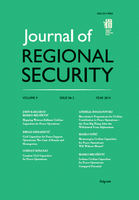Macedonia’s Preparations for Civilian Contribution to Peace Operations: the Next Big Thing After the Withdrawal From Afghanistan
Abstract
Macedonia is lacking a strategy for civilian contribution to peace operations. There have been initiatives and sporadic attempts to address the issue but these were never intertwined into a coherent policy. Civilian participation in peace operations remains on the radar of Macedonia’s authorities and would largely benefit from external involvement in the form of provision of guidance both at strategic and operational levels. In times of austerity, blockade of EU and NATO processes and withdrawal from Afghanistan, putting an emphasis of civilian contributions to peace operations may be viewed as a natural continuation of Macedonia’s input to international peace and security. This paper aims to assess the developments related to Macedonia’s contribution to peace operations through civilian means by mapping its potential capacities and areas of expertise. It therefore outlines and recommends the development of civilian components for peace operations and post-conflict societies growing out of the experience that Macedonia has had in policing, crisis management and media training.
References
Duro, Foto et al. 2013. “Progress in the Europeanization of the Security Sector in Albania, Kosovo and Macedonia.” Pristina: Kosovo Centre for Security Studies, Friedrich Ebert Stiftung http://analyticamk.org/images/stories/files/Progress_of_ Europeanisation_of_the_Security_Sector_in_Albania,_Kosovo_and_Macedonia.pdf
European Union. 2009. “European security and defence policy: the civilian aspects of crisis management.” Last modified August 2009. http://consilium.europa.eu/uedocs/ cmsUpload/090702 Civilian aspects of crisis management - version 3_EN.pdf.
European Union. 2012. “The EU and the Republic of Macedonia sign agreement to enhance crisis management cooperation.” http://www.consilium.europa.eu/uedocs/ cms_Data/docs/pressdata/EN/foraff/133249.pdf.
James Dobbins et al. 2008. “Europe’s Role in Nation – Building: From the Balkans to the Congo.” Santa Monica: RAND Corporation.
Law on sending personnel in international missions and international organisations. Official Gazette No.150, 2007.
Ministry of Defence. “Stit.” Last modified June 2013. http://www.morm.gov.mk/data/ file/Shtit/46 Shtit.pdf.
Ministry of Foreign Affairs. 2013. “Draft Law on International Development Cooperation” October 2013. http://www.mfa.gov.mk/sites/default/files/zakoni_ dokumenti/-Закон%20за%20спроведувае%20на%20развона%20соработка.doc.
Ministry of Internal Affairs. 2007. “EU integrations Bulletin .” Last modified 31 May 2007. http://www.mvr.gov.mk/Uploads/Bilten 31.05.2007.pdf.
Ministry of Internal Affairs. 2009. “Strategy 2009–2011.” Last modified September 2008. http://www.mvr.gov.mk/uploads/strateski%20plan%202009-2011,%20 fevruari%202009.pdf.
Ministry of Internal Affairs. 2006. “New helicopters with most sophisticated equipment.” Last modified June 02, 2006. http://www.mvr.gov.mk/ ShowAnnouncements.aspx?ItemID=7093&mid=1289&tabId=235&tabindex=0.
Ministry of Internal Affairs, 2014. “Unit for cooperation with NATO and classified information” http://www.mvr.gov.mk/desktopdefault.aspx?tabindex=0&tabid=206.
Rules and procedures for selection of police officer for working abroad.Official Gazette 76,2007.
Stalevski, Ljupco, 2011. “Stabilization and Reconstruction Capabilities.” Speech at a conference “Regional Security Dynamics in the Western Balkans” organised by Analytica think tank, November 17. Skopje, Macedonia.
Authors retain copyright of the published papers and grant to the publisher the non-exclusive right to publish the article, to be cited as its original publisher in case of reuse, and to distribute it in all forms and media.
The published articles will be distributed under the Creative Commons Attribution 4.0 International License (CC BY). It is allowed to copy and redistribute the material in any medium or format, and remix, transform, and build upon it for any purpose, even commercially, as long as appropriate credit is given to the original author(s), a link to the license is provided and it is indicated if changes were made. / The published articles will be distributed under the Creative Commons Attribution ShareAlike 4.0 International license (CC BY-SA). It is allowed to copy and redistribute the material in any medium or format, and remix, transform, and build upon it for any purpose, even commercially, as long as appropriate credit is given to the original author(s), a link to the license is provided, it is indicated if changes were made and the new work is distributed under the same license as the original.
Users are required to provide full bibliographic description of the original publication (authors, article title, journal title, volume, issue, pages), as well as its DOI code. In electronic publishing, users are also required to link the content with both the original article published in Journal of Regional Security and the licence used.
Authors are able to enter into separate, additional contractual arrangements for the non-exclusive distribution of the journal's published version of the work (e.g., post it to an institutional repository or publish it in a book), with an acknowledgement of its initial publication in this journal.
Authors are permitted to deposit author’s pre-print / author’s post-print (accepted version) / publisher's version (PDF) of their work in an institutional repository, subject-based repository, author's personal website (including social networking sites, such as ResearchGate, Academia.edu, etc.), and/or departmental website prior or during the submission process / at any time after the acceptance of the manuscript / at any time after publication.
Full bibliographic information (authors, article title, journal title, volume, issue, pages) about the original publication must be provided and links must be made to the article's DOI and the license.

